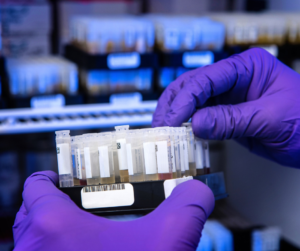It can be difficult to onboard advanced practice providers (APPs) into an oncology practice. It’s common for new hires to come from other specialties or be new graduates with little to no oncology clinical experience. But that doesn’t stop New Mexico Cancer Center (NMCC) from hiring them.
Annette Fontaine, MD, chief medical officer for NMCC, believes every APP’s previous experience is valuable and the rest can be taught through the onboarding program she’s cultivated with other NMCC leaders. Utilizing a mix of on-demand education, clinical practice, and leadership support, their onboarding program has resulted in confident providers, improved employee retention, and excellent patient care.
NMCC’s program is customized to each APP but consists of 3 main components: on-demand education, rotations, and continual feedback from NMCC leadership. The program immerses new hires for their first 3 to 6 months in building knowledge from on-demand education they can complete either at the center or at home and rotating through the center’s oncologists, APP leaders, and subspecialty departments. This strategic and comprehensive onboarding approach has proven to build confidence and improve the ability of APPs to effectively care for patients with cancer while utilizing skills from previous experience.

Annette Fontaine, MD
Chief Medical Officer - NMCC
The Search for a New Onboarding Partner
When Fontaine learned the organization that she previously used for onboarding APPs had discontinued its online education, she started the search for a new provider. Since on-demand education is a cornerstone of their program, it was paramount for NMCC to partner with an organization that had practical and useful education for APPs. She contacted Horizon CME to see if its online education could replace the previous provider’s and, more importantly, be a good fit for their onboarding program.
Fontaine selected a mix of Horizon’s on-demand modules, starting with its Oncology 101 and 102 courses, which paired well with their program. As an APP moves through the onboarding program, they can select additional modules based on the APP’s educational needs. Not only does the content fit the needs of recent graduates and providers new to oncology it also provides oncology experience. “Horizon is very valuable to the oncology community,” Fontaine said. “Horizon offers so many topics, including supportive care education that is so important.”
The on-demand education and practical training during rotations with the feedback of their physicians and leaders are key factors in building an APP’s confidence in providing high-quality patient care because they are absorbing knowledge at their own pace. “It’s very important to have the educational piece with the practical piece of onboarding,” Fontaine said. “APPs can come back to physicians to ask questions and get a good solid grasp of the diagnosis.”
Fontaine has observed how their confidence-building program also leads APPs to stay with their center longer—an average of more than 2 years compared to the national average of 1 to 2 years for APP employment. She credits the structure of their program, which provides opportunities for center leaders to give encouragement, highlights areas for improvement, and recognizes excellent work, making APPs feel valued. “It makes a difference to their confidence level,” she said about the onboarding interactions between APPs and center leadership. “We constantly hear that they feel valued.”
Cost of Turnover in Health Care Is High
However, the allied health landscape tells a different and costly story. More than one-third of all new nursing hires left within the first year and one-half left within 2 years as reported by the 2022 NSI National Health Care Retention & RN Staffing Report. Data from a SullivanCotter 2020 report estimated direct APP turnover costs to be $85,000 to $114,000 per position due to recruitment costs, onboarding, and precepting time. This can result in millions of dollars lost to turnover, which averaged over 2021 and 2022 at 20% for nurses and 12% for APPs as reported in the 2023 National Health Care Retention & RN Staffing Report.
More importantly, an insufficient onboarding program greatly impacts an APP’s ability to provide care at a basic level. Data from Hwa et al and Key suggest new hematology and oncology APPs begin to feel competent in providing care at 12 to 24 months. While there are situations where an APP will be expected to practice and treat patients immediately, this is unsafe and unrealistic for APPs new to oncology. There is a significant learning curve in the specialty to avoid errors and negative patient outcomes, which is one of the primary reasons that drives NMCC’s onboarding approach.
High-quality patient care and confident APPs are the result of NMCC’s robust onboarding program. For Fontaine, providing their APPs with the education, knowledge, confidence, and support they need to thrive in oncology is a large part of providing the best patient care that results in quality patient care. “We couldn’t do it without them,” she said about NMCC’s team of APPs. “It’s everybody working together to provide the best care for the patients.”
Go here to learn more about HCME onboarding initiatives.
For more information
Hartsell, Zachary, Noecker, Amy. (2020) Quantifying the Cost of Advanced Practice Provider Turnover. SullivanCotter. Accessed March 11, 2024. https://sullivancotter.com/wp-content/uploads/2020/02/Quantifying-the-Cost-of-Advanced-Practice-Provider-Turnover.pdf
Hubbard, K.B., and DeMeyer, E.S. (2023). Structured Onboarding and Residency Programs for Oncology Nurse Retention. Cancer Nursing Today. Accessed March 10, 2024. cancernursingtoday.com/post/structured-onboarding-and-residency-programs-for-oncology-nurse-retention
Hwa, Y. L., Marshall, A. L., Shelly, J. L., Colborn, L. K., Nowakowski, G. S., & Lacy, M. Q. (2019). Assessment of the Need for a Hematology-Specific Fellowship Curriculum for Advanced Practice Providers Using a Needs-Based Survey. Journal of oncology practice, 15(7), e593–e599. https://doi.org/10.1200/JOP.18.00697
Key, M. (2019). Bridging the Oncology Practice Gap, Oncology Issues, 34:1, 52-59, https://doi.org/10.1080/10463356.2018.1553423
Nursing Solutions, Inc. 2023 NSI National Health Care Retention & RN Staffing Report. Accessed March 10, 2024. https://www.nsinursingsolutions.com/Documents/Library/NSI_National_Health_Care_Retention_Report.pdf
Valente, C.P. (2021). Hematology/oncology APP onboarding important to ‘close the knowledge gap’. HemOnc Today. Accessed March 10, 2024. www.healio.com/news/hematology-oncology/20210719/hematologyoncology-app-onboarding-important-to-close-the-knowledge-gap







